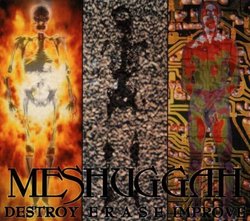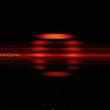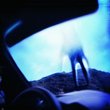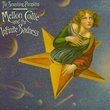| All Artists: Meshuggah Title: Destroy Erase Improve Members Wishing: 0 Total Copies: 0 Label: Nuclear Blast Americ Release Date: 7/25/1995 Genres: Rock, Metal Styles: Progressive, Progressive Metal, Alternative Metal, Death Metal Number of Discs: 1 SwapaCD Credits: 1 UPCs: 727361687427, 5051083013192, 727361687441, 727367687445, 829410359450 |
Search - Meshuggah :: Destroy Erase Improve
 | Meshuggah Destroy Erase Improve Genres: Rock, Metal
|
Larger Image |
CD DetailsSimilarly Requested CDs
|
Member CD ReviewsReviewed on 12/20/2009... A technical marvel, this is Meshuggah's 1995 effort into math-core/post-progressive metal. Featuring shattering riffs in ranges below standard tuning, it growls and grimaces to the poly-rhythmic timing of technical drum-beats. The album begins on a destructive, alarming note and cascades into odd time signatures and ends on shifting grounds. If you like progressive metal heavy on the odd time signature and growling guitars of metal, you may like this album!
CD ReviewsRedefining Heavy Tom Z | USA | 07/17/2004 (5 out of 5 stars) "People who think being heavy means downtuning your guitar, burping into the microphone and ignorantly yelling about Satan and anarachy will be proven dead wrong after hearing this. (Not that I don't like those bands, they just get boring after awhile)The riffs pulse like machine guns yet can actually be classified as music as well. Jens Kidman produces a quality vocal performance which sounds a bit like Kill em all era James Hetfeild done in a more death metal style. The solo's are downright alien sounding and 100% original. I know this is a pretty big statement, but no one out there right now sounds as original as Fredrik Thordendal when it comes to solo's. The rhythem section is solid and keep up with the music, which is a huge compliment right there. Lyrically they focus on abstract stuff that you really have to think about to understand a bit like Tool. I would recommend to this to many people since it is enjoyable on many different levels. If your into intelligent heavy stuff or just want to bang your head, this is the album for you. One of my personal favorites of all time. I recommend getting Death, In Flames, Opeth, At the Gates, Decapitated and Fredrik Thordendal's Special Defects(if you can find it!) in addition to this album." Sonic Giger. Lord Chimp | Monkey World | 12/07/2002 (5 out of 5 stars) "To the uninitiated, Meshuggah's music is relentless: odd-metered, crippingly heavy power chords (Meshuggah uses 7-string guitars further detuned by a minor second); anti-melodic and seemingly amorphous structural blobs of inorganic noise give the listener no purchase. Bassist Peter Nordins picks monstrous bass lines to layer the guitars about one octave lower -- since the guitars themselves are already detuned to quite a low level, there is little breathing room amidst the storm of riffs, creating a dense, suffocating attack. However, the bass never bleeds into the guitars' own frequencies or gets drowned out by them (as is the case with most metal bands), so Meshuggah's sound has a great sense of sonic expanse. Drummer Thomas Haake usually plays 4/4 on the cymbals and snare drum, subdivided with odd-time signatures on the bass drums. Interestingly, he executes few fills, and those heard are quick and simple. Rather than dexterity, Haake's strength is rhythm and impressive sense of time. The robotic vocals of Jens Kidman are single-note, vicious shouts executed solely for rhythmic effect -- there is no melody in Meshuggah's vocals. The vocals themselves are executed in unusual time signatures as well, generally independent of the guitars themselves. Catchy music Meshuggah is not (Hater of the Human Race's comments notwithstanding, heh). The band's assailments occasionally retreat into haunting atmospheres of chiming arpeggios, and even these seem heavy. The production is distancing and There is pretty much zero emotion in the music -- this is heartlessly intellectual, and virtually inhuman. (This fits with lyrical themes of organisms merging with technology.)Personally, I barely consider this album "fun". This is the kind of thing I soak up with my brain and leave my heart squarely at the curb.Yet, to the Meshuggah fan, all the difficult, disagreeable things I described above are key elements in what makes the band distinct and amazing. It's all a matter of perspective.Meshuggah defines mutation of rhythm, their pulverizing jackhammer rhythms writhing in different time-signatures like a tortured cat. If a metalhead tried headbanging to this stuff he'd probably look like he was in the throes of a seizure.Frederick Thordendal's unique guitar solos evoke a demented, bizarro Allan Holdsworth. Like Holdsworth, he uses a breath controller for his guitar. With this he accomplishes a tremolo-like staccato effect like a super-computer punching out lines of code. Among the armies of Hammett and Malmsteen imitations in metal, Thordendal is easily one of the genre's most unique soloists. To get the full Meshuggah experience, it would help to be versed in some music theory. I have to say I can't completely understand the music (but at least I admit it, eh?), but I still love it -- it is unique, powerful, challenging, and unmerciful. Also worth mentioning is the fact that Meshuggah doesn't have any notable imitators -- I think that would trivialize what they do, unless of course someone came along who did it better (good luck!). As a side-note, I saw Meshuggah open for Tool in October and needless to say I was impressed. Granted, I was a little too far away to get wrapped up in the performance's intensity (if it's a metal show I like to be close), so it was a dull enjoyment. But beholding their flawless execution of this Einsteinian metal was fookin' impressive. Composing and recording it in the studio is one thing, but to play it live...eegah! Such is a testimony of Meshuggah's uncanny talent.Cold, mechanical, and cerebral, _Destroy Erase Improve_ is high-art out of Sweden...without a doubt one of the best and most original metal albums ever."
|

 Track Listings (10) - Disc #1
Track Listings (10) - Disc #1

